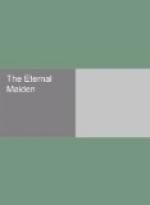“Attalaq is strong,” said one.
“Yea, as a boy did he not kill his brother?” All remembered the brutal encounter of the two brothers years before, when, throwing him to the ground, Attalaq jumped on his brother’s body and striking his head with stones beat him to death. Attalaq was a type of the older warriors; unlike his more gentle tribesmen he possessed the atavistic savagery of his forebears of centuries ago when it was customary to abduct brides.
An excited crowd gathered outside of Attalaq’s house. Soon Attalaq himself appeared. He was exultant.
“Ha! Ha!” he laughed. “Methinks that is the way to treat a woman!” Then with swollen-up gusto he told them all about it. Tiring of being alone he determined to carry off Ahningnetty. “A woman’s mind is as the wind—it constantly changeth,” he said. “Women should be driven as the dogs.” Ahningnetty, still weeping, still protesting, came to the door. Attalaq turned fiercely upon her and struck her in the face. Then he laughed again. The girl screamed.
“Well,” he said, turning to her. “I carried thee here—if thou wouldst return thou canst walk back. Eh?” The girl cowered away, but on her face there was the semblance of a pleased expression. The other women regarded her with a tinge of envy.
“’Tis not often in these days a lover careth sufficiently to carry a maid away,” said an aged crone.
“In the days of old there were men like Attalaq,” said a younger woman, admiringly.
“Where is Papik?” one asked. He was not to be seen.
“Dost thou not wish to return to thy father?” Annadoah asked Ahningnetty, approaching her.
The girl shook her head. Much as she had protested, she was unquestionably pleased by the forcible abduction.
One of the gossips, desiring to impart the unpleasant news to Papik, had gone to his house.
“Papik sits alone,” she called, on her return. “And when I told him Ahningnetty hath been carried away by Attalaq, he replied, ’’Tis well! ‘Tis well!’ And then he showed me his hands—they were frozen—frozen! Verily, he would now be a sorry husband to provide for a wife.”
“Papik’s fingers frozen!” took up the others. “Unhappy Papik.”
“He sobs and weeps—he sobs and weeps,” said the old woman. “He saith the dreaded misfortune hath come, and the days of his skill on the hunt are over!”
“Long fingers, short hunt; long nose—short life,” remarked Maisanguaq, sententiously.
Attalaq, happy in his conquest, was broad enough to be generous. He declared that Papik should never want as long as he could shoot the arrow. Generous-hearted, many of the others joined in and bits of blubber were soon offered the lonely Papik, as he sat, nursing his frozen members, in his house. The mishap was tragic, for, his hands injured, he had lost not only his skill in the hunt but his ability to protect himself in case of accidents. And from the experience of ages all knew that, sooner or later, he was doomed to a comparatively early death.




